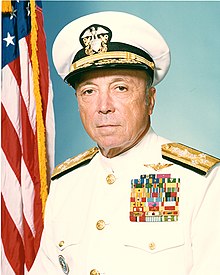Maurice Franklin Weisner (November 20, 1917 – October 15, 2006) was a four-star admiral of the United States Navy who served as Vice Chief of Naval Operations from 1972 to 1973; commander in chief, United States Pacific Fleet from 1973 to 1976; and commander in chief of the United States Pacific Command from 1976 to 1979.
Maurice F. Weisner | |
|---|---|
 Admiral Maurice F. Weisner | |
| Born | November 20, 1917 Knoxville, Tennessee |
| Died | October 15, 2006 (aged 88) Pensacola, Florida[1] |
| Buried | |
| Allegiance | United States |
| Service | United States Navy |
| Years of service | 1937–1979 |
| Rank | Admiral |
| Commands | United States Pacific Command United States Pacific Fleet Vice Chief of Naval Operations United States Seventh Fleet Carrier Division One USS Kitty Hawk USS Coral Sea |
| Battles / wars | World War II Korean War Vietnam War |
| Awards | Defense Distinguished Service Medal (2) Navy Distinguished Service Medal (4) Army Distinguished Service Medal Air Force Distinguished Service Medal Legion of Merit (2) Distinguished Flying Cross (2) |
Naval career
editWeisner graduated from the United States Naval Academy in 1941 and served aboard USS Wasp (CV-7) as a member of the ship's company until it was sunk in September 1942. He then graduated from flight school, becoming a Naval Aviator in 1943 and returning to combat in the Southwest Pacific until June 1945. He was credited with the sinking of a Japanese destroyer escort during that tour. During a career spanning 38 years, he served in six aircraft squadrons, commanding three, and commanded two ships, including USS Coral Sea, two carrier divisions in the Pacific, and the United States Seventh Fleet.
Awards and decorations
editWeisner's awards and decorations include:
- Foreign decorations from Japan, the Republic of Korea, Republic of Vietnam, Philippine Republic, Kingdom of Thailand and the United Nations.
- As the senior active duty naval aviator, he received the Gray Eagle Award.
Retirement
editWeisner retired from the navy in November 1979. In retirement, Weisner presided as president of the Naval Aviation Museum Foundation until 1993.[2] He died in 2006 and was buried in Barrancas National Cemetery.
References
edit- ^ "Maurice Weisner, 88; Admiral Headed U.S. Pacific Forces in 1970s". Los Angeles Times. October 20, 2006.
- ^ "Maurice Weisner Obituary (2006) – Washington, DC – the Washington Post". Legacy.com.